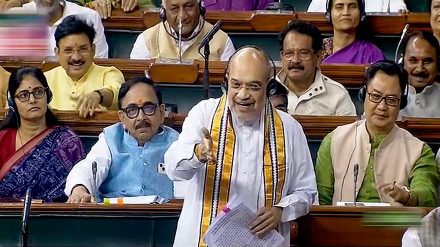Union Home Minister Amit Shah on Thursday while introducing the Delhi Ordinance Bill said that there are provisions in the Constitution that would allow the union government to make laws for Delhi.
Shah moved the Government of National Capital Territory of Delhi (Amendment) Bill, 2023 to replace the Ordinance for control of services in Delhi for consideration and passing in Lok Sabha.
“There are provisions in the Constitution that allow the Centre to make laws for Delhi,” Shah told the Lower House.
Taking a veiled dig at the Arvind Kejriwal-led Aam Aadmi Party (AAP), Shah said, “In 2015, a party came to power in Delhi whose only motive was to fight, not serve…The problem is not getting right to do transfer postings, but getting control of the vigilance department to hide their corruption like building their bungalows,” Shah added.
Shah further said that “some sides claimed that the Centre doesn’t have the powers to make laws about Delhi”.
“Pandit Nehru, Sardar Patel, Rajaji (C Rajagopalachari), Rajendra Prasad and BR Ambedkar were against the idea of Delhi being given the status of full statehood,” he said.
The union minister further appealed to Opposition MPs to “think about Delhi and not their alliance”. The INDIA bloc alliance, which also includes AAP, has been opposing the Bill.
Meanwhile, Congress leader in the Lok Sabha Adhir Ranjan Chowdhury, took a dig at Shah over the Nehru reference saying, “When you need, you take the help of former Prime Minister Jawaharlal Nehru. If you had actually taken the help of Nehru then the country would not have witnessed Manipur and Haryana.”
On May 19, the BJP-led union government promulgated an ordinance to create a National Capital Civil Service Authority in order to administer the transfer and posting of bureaucrats serving the Delhi government, thereby nullifying a Supreme Court verdict passed on May 11 stating that the AAP government in Delhi has legislative power over bureaucrats in all departments other than public order, police and land.
The Supreme Court has also held that the Lieutenant Governor was to act on the “aid and advice” of the council of ministers in the Delhi government.
